|
Want to be notified when the blog is updated? Want to share your own story or offer some encouragement? Want to mock me until I'm a blubbering wreck? Whatever the reason, click HERE to send me an email. If you've got something to say, I want to hear from you. I'll honor wishes to remain anonymous, but make no other promises. Anything you send might (or might not) appear in the blog. | ||||||||||||||||||||||||||||||||||||||||
| ||||||||||||||||||||||||||||||||||||||||
|
Old Jails & Broken-Down Boots As mentioned in my last entry, my ankle has been giving me some problems. So I decided to dig out two pairs of my old factory boots and see if they would be more supportive. Since I hadn't worn them in a long time, we decided to do a short 4-mile walk from Sperryville to Washington, VA to test them out. The walk turned out to be much shorter than planned.
Dawn, ever supportive, called out, "Don't move. I've got to get a picture of this!" Sage piece of advice for the day: don't trust footwear that has been living in a duffel bag in your attic for about a decade. The second pair of boots faired better, though my feet did not. Factory boots may protect your toes from injury and be supportive of your ankles, but they are not built for long hauls. The cups of the steel toes dug into my skin and I wound up with a blister. Though our short hike finished up in the tiny town of Washington, VA�which, by the way, is the only one of more than thirty "Washingtons" in the U.S. to actually be surveyed and platted by George Washington himself�we would be spending the night 25 miles away in Warrenton. That was the closest place I could find a hotel. I located a Howard Johnson's directly on my walking path, but then I discovered there was a Holiday Inn Express that was slightly more than a half-mile off the path in (drum roll please) Walker Business Park. How could I resist? We parked the car in Warrenton and explored the Old Town area on foot, stopping in at a restaurant located in the old train depot. The food was delicious and the interior was swanky, including a glass case showing the train station and town as they had been in 1925. No one paid any heed to the grossly underdressed sweaty man snapping pictures of everything.
We walked through the Old Jail Musuem's cellblock and checked out the "hanging yard," but were confused by many of the antique items in various display cases. There were cooking utensils, a dentist's chair, and even Nazi uniforms. "Many people don't know this," I said, "but Hitler's dentist was caught in Warrenton and served out his time as a chef." Apparently, the Old Jail Museum is named that more for the location than for the theme of the items on display. I'm guessing that any antique, relic, or dusty doo-dad that anyone felt like donating were welcomed with open arms. And if they still feel that way, that's great news for me! Because I'm looking to get rid of�I mean, donate�a pair of old factory boots. Forgetting to Take Ginkgo Ginkgo biloba is supposed to help your memory, but it's not much use when you can never remember to take it in the first place. This is the category Dawn and I fell into this weekend. Probably other weekends, too. Okay, definitely others. First you need to understand that this weekend's trip came about as a last minute expedition. Originally, Dawn was planning to stay home on Friday and take out a good friend of hers named Chip to thank him for a recent good deed. But then she got a work assignment that was sending her to Fredericksburg on Friday and we figured as long as she was in the area we'd make good use of her travel time. I met her in Fredericksburg at the conclusion of her meeting and we caravanned out to Warrenton for yesterday's walks. So, after the walks, dinner, and showers, I whipped out the map last night to discuss today's walking plan with Dawn. I pointed out how we would use the two cars to leap-frog along the route and Dawn's eyes glazed over as they often do when I get into logistics. "By the way," I added, "What did you ever do about that thank you meal?" Dawn jerked upright, her eyes sprung wide open, and she yelped, "Omigosh! Chip!" I busted her chops about forgetting her lunch and all she could do was sit there and take it, figuring I had just saved her from a terrible faux pas. "You know," I told her, "I'm going to be using this as a Get-out-of-jail-free card for a while." I continued to poke fun at her this morning as she drove me out to my drop-off point. As I got out of her car and felt the sun beating down on me, that was the moment I realized I'd left the new bottle of sweat-proof sunscreen sitting on the front seat of my car. As much as I hated to do it, I had to tell Dawn about it and ask if I could borrow her roll-on Sunstick. After several minutes of mocking laughter, she finally passed it over. Then she drove back to Newport News for her lunch and I began my 11-� hike to Amissville. The weather forecast had not only said today would be a scorcher but that there was also a chance of intermittent storms. I'd meant to pack my poncho in my rucksack, but, of course, it was sitting snugly in my car along with the sunscreen. Oh well. If I got wet, I got wet. At least Dawn was no longer there to razz me about it. As it turned out, there wasn't a cloud in the sky and the heat was brutal. Heat reflected off the hills of asphalt in shimmering waves, doubling my agony. I was soon wishing it would rain just so I could cool off. I went through the gallon of water I was carrying and stopped at a convenience store and picked up two quarts of Gatorade. Intense heat, it turns out, acts just like ginkgo and I began to remember all the other times I'd forgotten important things: friend's phone numbers, friend's birthdays, friend's names. As Dawn often likes to say, "It's a wonder you have any friends at all." But perhaps the most embarrassing moment of forgetfulness happened just a couple of months ago. I'd won a cash prize for placing second in the adult poetry section of a literary contest and had been invited to attend a reception where the top three winners in each category would read their work and be honored. This was the night before one of my walks and I got wrapped up in my preparations and planning the logistics that, well, I simply forgot about it. I didn't remember until two days later when Dawn and I were walking down the road and I suddenly stopped and my eyes sprung wide open. "Omigosh," I yelped, "you'll never believe what I just remembered!" As you can imagine, Dawn received my news with kind and empathetic supportiveness, which is why I showered her with similar "support" last night and this morning. Unfortunately, my missed event had photographers present and when a story appeared with the title "Literary Competition Winners Honored," it included a photo of the winners and a caption listing their names. At the end of the list, it said, Not pictured: Bill Glose. Not one to miss an opportunity to twist the blade in my back, Dawn doodled on the photo and added an ink drawing of me in the back row. 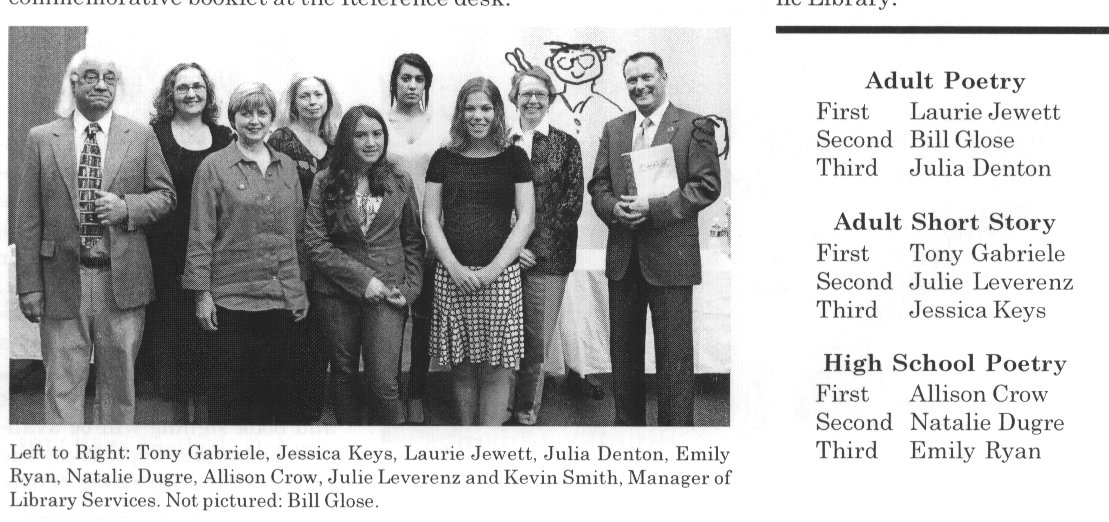 Now, if I can only remember where I put the phone book... The Incredible Shrinking Island In the middle of the Chesapeake Bay sits an island that is lost in time. Soon, it will also be swallowed by time.
The population, as with the island itself, is shrinking. These days, few of the island's combined school's (K through 12 in one building) graduates stick around. An underground cable brings in power and cable television, showing them what the outside world has to offer, and most leave the first chance they get. Leaving the island is normal; coming to the island is rare. Unless you count tourists.
Though officially considered part of Virginia, the quickest water route to Tangier is 45 minutes via the Crisfield Ferry out of Maryland. Regular ferries also feed the island from Onancock on Virginia's Eastern Shore and from Reedville on Virginia's Northern Neck, but the Virginia ferries take twice as long to reach the island. Ferries bring mail, supplies, and tourists, and when needed a police boat will bring someone to the mainland, since Tangier has no jail itself. But the main traffic constantly runs in and out from shore during the week: fishing boats loaded with wire mesh cages to pull life's blood for the island from the salty depths.
Last year on the day after Christmas, I'd hiked out to Reedville with my friend Greg Wissinger in preparation for my trip to Tangier Island. I'd wanted to connect the route of my walk with the docks where I would step aboard the ferry. I couldn't walk across water to the island so I would walk to the tip of the shore instead. Today, Dawn and I drove out to the main docks where I'd left off before and we started to ask around about the ferry to Tangier. The first guy I'd asked hemmed and hawed for a while, taking 5-10 minutes to essentially say, "I don't know." Then the second person told us that we were in the wrong place altogether. "The ferry don't take off from here," she said. "You need to head out to Buzzard Point." It had taken us two hours to drive out here and now we were in danger of missing the ferry, the Chesapeake Breeze, which departed for the island only once per day at 10 a.m. It was 9:55 and I did my best NASCAR driver impersonation to get there in time. I pulled into the parking lot at 10 on the nose, expecting to see the ferry pulling away from the dock and relieved to see it still moored. "Let me out here and I'll see if I can hold it up," Dawn offered. She jumped out while I parked the car, then I hustled to the ticket booth. The attendant shook his head as he gave me two tickets and when I asked for a receipt, he laughed out loud. "People who arrive at 10 shouldn't be asking for extras." As we rushed over to the gangway, the ticket taker glanced down at his watch then looked up at us with arched eyebrows. All I could do was shrug and say, "Sorry." This would turn out to be my mantra for the day. Aboard the Chesapeake Breeze, we settled in for the long ride across the bay and listened to the guide telling us interesting facts about Tangier and the surrounding area. After a half-hour of roasting in the sun, we moved to plastic seats that were bolted to the deck beneath an awning toward the front of the boat. As the deck pitched and heaved we shimmied and weaved, and when I reached the chairs I grabbed the back of one to right myself. That was when I discovered that not all of the chairs were bolted down. Rows of plastic chairs were linked together, but only the ones on the ends were attached to the deck. The chair I grabbed came up and started pulling the rest of the row with it. I managed to catch myself before doing any permanent damage, giving everyone around me a good chuckle in the process. "Thank you," I said, bowing, "I'll be here all day." "I thought for sure you were ripping out that entire row," Dawn said between gales of laughter. "I just kept picturing you going over the side with a string of chairs trailing behind you." The same vision had gone through my mind.
After the tour, we grabbed a delicious lunch at one of the restaurants�seafood, of course�then decided to walk the same path we'd ridden on the golf-cart tour. I probably snapped a hundred pictures and we chatted to a few locals. One boy pointed out for us where some ducks were hiding in the marsh grass then told us he had a couple of them at home. When we stopped at Spanky's for ice cream, I asked the proprietor how they'd fared this past winter. "Did you get a lot of snow out here, too?" "Yep." "That must have been tough." He just stared blankly back at me. "Did it affect you much?" "Not much," he said. Obviously a man of few words. "But how did you deal with the snow? I mean, you don't have plows or anything. What'd you do?" I was hoping for a tale of men coming together to dig each other out, something akin to the cooperative effort to bring in a mobile home from the mainland and set it in place. But no such story sprung from his lips. "Snow melts," he said. "We just let it melt." The ferry was due to leave in about 10 minutes, so we said goodbye to Mr. Motormouth and headed for the docks. When we'd landed, the captain had made the announcement: "The ferry will depart at 2 o'clock. If you miss it, don't worry. Another one will be along tomorrow." I had no intention of cutting this one as close as I had this morning. However, there was a store right next to the dock and I didn't see any harm stopping in to buy a couple of keepsakes before leaving. We picked our items quickly and stepped into line at the register with 6 minutes to spare. There was only one person in front of us, so it didn't seem like there would be any problem. I couldn't have been more wrong. The teenage boy at the register was apparently a trainee. A woman stood at his shoulder and when he tried to hand change to the person in front of me, the woman said, "Did you add the tax?" He couldn't remember, and so he re-rang the order. As he did, the woman again coached him, telling him that he was doing the process out of order. Flustered, the boy slowly searched the register for the right key to hit. But he wasn't just slow; he was Tangier slow, which was another whole magnitude of leisurely moderation slower than anything I was used to. Minutes ticked by and just as I was about ready to place my items back on the shelf, he finished up and asked if he could help me.
He punched my tickets and we breathed a sigh of relief. I was all sweaty from the rush around the island, and we searched for a seat inside the air conditioned lower level. All the booths were taken, but we asked a couple if we could join them at their table and they said, "Sure." Jeff and Teresa not only shared their table, but after we landed back on the mainland, they gave us a ride up the road so we could walk the couple of miles from US 360 back to Buzzard Point, officially connecting my route to the correct dock. Dawn and I are both persnickity when it comes to timeliness, so we were both a little frazzled from our discombobulated day. But as we hiked the couple of miles back to Buzzard Point, I tried to put a positive spin on things. "You know," I said, "We couldn't have packed more in today if we'd tried. So, in a way, our timing was perfect." Dawn just shook her head and soon her shoulders were shaking. Then she was bent over chortling and I knew without her having to mention it that she was replaying the scene of me going overboard with a banner of plastic chairs flapping behind me. I'd be hearing about that one for a long time, along with the rest of today's gaffes and near misses. And just like that, my positive spin, like the island we'd just departed, began to sink. Walking Through Horse (and Hopper) Country
But the posh environs had little impact on me and my walking mate, Dawn. When we stopped in a country store and overheard the cashier asking the man she was serving, "Would you like a bag with that?" I immediately responded as if she were talking to me. "No thanks," I said, patting Dawn's shoulder, "I already have one." The cashier came to Dawn's defense, pulled a carved walking stick from an umbrella rack and came at me with it, pretending to whack my shins. "This is what we used to do in lacrosse," she said. "Just say the word and I'll take care of him." I was not the only uncultured sap today. When we stopped outside a convenience store and noticed a bedraggled Grizzly Adams impersonator milling about in front of it, Dawn elbowed me and said, "Fast forward 20 years and that's you." Zing. She hadn't yet learned about Karma and how bad deeds come back to haunt you (I'd learned, but long ago stopped caring; Bad Karma has kicked my butt so many times it's become my status quo). Today Bad Karma would come after Dawn in a little green form and it would literally teach her that it is sometimes better to keep your mouth shut. Our plan for today was to walk from Amissville to South Wales, a distance of about 7 miles. Not terribly long, though a few factors conspired to make it feel that way. First off, we got a late start on a hot day�not a good combination. Secondly, the constantly rolling hills made for difficult slogging for a couple of flatlanders like us. Also, the distance seemed longer than 7 miles because it actually was; we tacked on another few miles in the Warrenton area after we finished the planned hike. But the biggest thing that made our miles seem to stretch out longer came from the unlikeliest source. You see, we were walking down Grasshopper Alley, and the residents wouldn't let us pass without a fight. Well, they were letting me pass, pinging off my chest and bounding off to be a nuisance elsewhere. The reason why this impeded my progress so much was that "elsewhere" usually turned out to be somewhere in Dawn's general vicinity, and it was impossible for me to continue walking when I was doubled over with laughter. Though Dawn has beaten back would-be muggers, hyped-out prisoners, and the occasional innocent bystander, she turns into a 6-year-old girl when a grasshopper jumps on her. She dances about with hands flapping in the air and shrieking. And, after they jumped in her shrieking mouth a few times, chugging and spitting out water for all she was worth. There's one other thing we've encountered on the road that Dawn hasn't handled too well and that's roadkill. I have just about no sense of smell and Dawn's is about as acute as a fox hound's, so I can walk right up on a splattered creature and not really notice it until I'm just about to step in it while Dawn will get an alarmed look on her face and warn me about it when we're too far off to distinguish the squish. The warning isn't meant to help me in any way; it's meant to get me looking for the dead body so she can close her eyes and I can guide her around it without her having to look at it. I was surprised to even see roadkill in horse country. I figured they'd have someone standing by on 24-hour duty to remove anything that despoiled the view. But, no, it was quite the opposite. Three times we came across a dead deer, each of which had been there for a different length of time. And each time, Dawn made her I'm-going-to-gag face about a couple hundred yards away and I grabbed her elbow and guided her until we'd passed the mess. "I could be a cadaver dog," she exclaimed. Well, sure, as long as they're no grasshoppers around. By the end of the walk, Dawn was pinching her nose and grimacing. Not so much from the road smears we'd passed but because I was particularly aromatic today. When we clambered into the hotel, she said, "Bill, I've got a special soap just for you. Use it!" Ever considerate, I promised I would. Then I gave her a bear hug. "The horror," she said, trying to squirm away. Unsuccessfully. After I'd taken my fourth shower, scrubbed down with bleach, and burned the clothes I'd been wearing, we headed out for the night's entertainment: the Lazy Susan Dinner Theatre. I knew it would be classy because the way they spelled "theatre," and I wasn't disappointed. Tonight's show was Shenandoah, a musical about a Virginia family that tries to continue tending its farm without being caught up in the throes of the Civil War. The Amish buffet was tasty, the cast was talented, and the production was excellent. One of the songs stayed with us for days and we found ourselves singing parts of it on the drive home and throughout our walk the next day: Next to lovin' I like fightin'. But best of all was that we got two shows for the price of one. Carolina Springs Middle School was in attendance that night and the drama being played out by the teenage girls at the table next to us was worth the price of admission. They kept asking their waiter to dish out details about the busboy. "Omigosh," one of them said, "he is sooo cute. How old is he? I've dated a 16-year-old before. I'll be 14 in July. See if you can get his number for me." When the busboy finally came over and hinted that he was gay, she didn't pick up on it and kept after him, giving her best lines until he left and stayed clear of the table. It had been a long day so we ordered drinks with our dinner. We each got the house specialty and it wasn't until they arrived that I realized I'd missed my chance to stick my butter knife in Dawn's back. I should have ordered her a grasshopper. But that was okay. I was sure the road would bring me plenty of chances to zing her tomorrow. And vice versa. Karma never sleeps and it always seems to be hopping mad at us. One Last Hill The Army prepared me for my walk across Virginia in more ways than one. There were, of course, the long marches over every sort of terrain with a heavy load on my back and hordes of enemy with malice in their hearts hiding in the dark and wishing to do me harm. These days, Dawn is the only one wishing to do me harm, usually staying her hand merely because I'm the one driving. Once she figures out she can simply rifle through my pockets after "an unfortunate accident," that's when I figure I'm a goner. Why, you might wonder, does Dawn have it in for me? Admittedly, I have, on rare occasion, given her reason to be mildly perturbed. Which brings me to the second thing the Army taught me that applies to my walk�lying. For most people, the ability to lie is a liability�this does not apply, of course, to politicians, lawyers, or Tiger Woods; but then the argument could be made that these aren't really people. For ordinary people though, truth is a commodity as valuable and necessary as breathable air. Even so, there are times when a little bit of smog is necessary. Such as during a long walk when a fatigued person asks, ever hopefully, "How much farther do we have to go?" My platoon sergeant loved it when troops would ask this question. His favorite answer was "Another mile or so," even when the "or so" portion of his comment stretched out to many miles. Other times he'd say "About another half-hour," and "about" would be the ambiguous portion of his reply. Each time, he'd reply in a comforting tone then turn to me with a devious smirk on his face. Though I didn't have anyone to turn and smirk at, this was what I envisioned today when Dawn made a comment about the never-ending hills before us. "Don't worry," I said, "this is the last hill. It's all flat land from here on out." Then, when we crested the hill and saw the next one looming beyond, I added, "Oops. That's the one I meant. That is the last hill." This went on for a while until finally Dawn told me to shut my pie hole. That is when I switched tactics�another lesson learned in the Army�and started my Clintonesque bending of the truth. "You know," I said, "this isn't really a hill. It's just a short interruption of our otherwise flat course. A minor disruption, that's all." And that is when the threats of bodily harm began. But I was not to be deterred. "Just tilt your head back and gaze up at the top," I suggested. "See? I told you it was flat. Just a matter of persepective." Good thing I've got some meat on my bones, otherwise she might have really damaged my arm from constantly slugging it. She, too, had changed tactics, having learned that negotiations were having little effect she'd launched an all-out offensive. Dawn figured out a two-prong method to get her up the hills. Step 1: ignore me. Step 2: churn her arms and deep breathe like a locomotive. Somehow, we both survived the day, hiking just short of 12 miles in two pieces, the first taking us from South Wales to Warrenton and the second taking us from Route 1 in Woodbridge to Potomac Mills, the giant shopping complex beside I-95. We were both pasty faced at the end and smiling. My smile was due to the homage I'd performed for my platoon sergeant and Dawn's was due to our final destination. For her, shopping malls were equivalent to some sort of utopia; for me, going to the mall was like a visit to the dentist�something to be dreaded and only undertaken when necessary. After today's merciless needling, it was necessary.
The Card Queen Once upon a time there existed a world without the Internet, TIVO, and cell phones. Instead of texting on a cell phone in the middle of rush hour traffic, people actually spoke with other people. Without avatars or cute screen names to hide behind, people actually knew who it was they were talking to. Without emoticons, they conveyed sincerity, sympathy, or sarcasm with actual facial gestures. Hard to believe, I know. Sometimes (gasp!) they even went outside and mingled with other flesh-and-blood humans. In this world of long ago existed a form of communication other than e-mail. It was called, oddly enough, mail. People would sit down with a pen and paper and write letters to friends who were too far away for a phone call. And whenever people would go away on vacations, they would send postcards to their friends back home to brag about all the fun they were having. Typically these omitted bouts of food poisoning and lost luggage, encapsulating their merriment with the phrase: "Wish you were here!" Meaning, of course, "Look where I am and you're not. Ha ha ha, loser!"
Her example has inspired me during my walk to send postcards to various friends while I'm out on my walks. Occasionally I'll add the time-worn sentiment "Wish you were here"�I put that on a postcard of a cemetery once for a few chuckles�but usually I'll share some of my adventures from the road or tell of interesting encounters. It takes a lot of time, but it doesn't feel like work. Instead it feels as if my friends are coming along for the ride with me. One of my friends has even sent me a few postcards in return. Any guess who that could be? That's right, Ann. Except her cards have been a satire of my own, bragging about her long walk to the mailbox and the adventures she's having in her back yard. If the delight I feel each time I find one her cards among the bills and junk mail is anything like what my friends feel when they get one of my cards, well then, I don't see myself stopping anytime soon. Especially since each time I write and send off a card, joy traces its finger up my spine and leaves me smiling for the rest of the day. All that for the price of a postage stamp and a few minutes of my time. Memory Lane Last December I did a long hike to Reedville with an old high school friend, Greg Wissinger. Recently I heard from his sister, Laurel, who in town visiting the folks and wanted to come along on one of my walks. "Okay," I said, "but you're going to have to make fun of your brother." "No problem," she immediately replied. "By the way, Greg's coming back to town next week. But feel free to blow him off." I came by her parent's house to pick her up in the pre-dawn hours, and when I pulled into the driveway I saw some activity in the yard next door. It was Laurel and her spastic and very friendly dog Telly. She waved me over. "Wrong house, Bill." Oops. Appears my orienteering skills had waned since my Army days. I blame the error on the sun in my eyes. True, it hadn't risen yet, but that's the best I could come up with. "That would have been a lovely surprise for my neighbors at 6 in the morning," Laurel said. She hopped in my car with one of her son's backpacks then patted one of its pockets. "I brought Pop Tarts." Well, heck, if she brought Pop Tarts we were ready for anything. So off we went.
By the time the sun rose, we'd arrived at the docks at Messick Point and begun our 7-mile walk back. We were in luck. A few work boats crossed in front of us and set off for the horizon as liquid crimson reflected off the rippling tide. A pelican skimmed the water and landed in the nearby marsh grass, emitting a screech like a howling pig. I took about a zillion pictures then noticed a gull sitting atop a stack of netting in one of the moored boats. I aimed the camera his way and took some more. Another man who'd been standing dockside saw what I was doing and said, "He's hoping he waits 'round long enough, he's going to get some morsels." "Hang around that net long enough, and he'll be the morsel," I said.
Wish I'd remembered Laurel had the Pop Tarts. I would have offered him one. But, we forgot, and after twenty-or-so minutes of loitering and snapping photos, we finally got on our way. As we turned onto Poquoson Avenue and passed by the Middle School, it became Laurel's turn to reminisce. She told me a story about riding bikes with her cheerleader friends and passing a bag of Dinosaur Sours between them when she accidentally bumping tires with the girl in front of her. The girl went down and Laurel rode over her, then hit the pavement herself. She still has a scar from the tumble. And what was her first comment to the friend she'd ridden over upon getting up from the wreckage? "At least you saved the Dinosaur Sours!" Laurel bolted across the street and weaved between cars without a second thought. "Hey," she said, "I'm a New York City girl." "I don't know," I said. "Taking your life into your hands." I waited for the three cars to pass�count them, THREE�and crossed over to catch up. "Just like New York traffic, huh?" "Back in New York," she said, "you got to use your horn to drive. Once, my horn was broken and I didn't know what to do. I use my horn more than my blinker."
"Lucky you weren't in line," I said. "Probably would've driven right over him." We chatted the rest of the way back to the house and arrived before we knew it. We even went up the correct driveway. We never got to the Pop Tarts, but otherwise the morning had been perfect. What a wonderful walk down Memory Lane. Battle of Third Manassas My good friend and writing mentor, Bill Walsh (aka, the old curmudgeon), once told me that Virginia is the "most historic, most blood-soaked land in the western hemisphere." This is where our history in America begins. English speaking settlers first landed at what is now Cape Henry on Virginia Beach, set up their first permanent colony a few miles inland at Jamestown, and began their expansion and conquest of this grand and bounteous new continent. When our forefathers decided it was better to live free or die, the last shots fired in the Revolutionary War occurred on Virginia's coast at Yorktown. And when the South seceded from the Union, touching off four years of horrific fighting between countrymen, neighbors, and brothers, it was Virginia's land, that middle ground between North and South, where most blood was spilled. Though I have covered more than 900 miles across the state on foot, taking note along the way of Civil War markers, monuments, and cemeteries, I have yet to visit and comment on one of the many battlefields. There are far too many for me to visit them all and their histories have been covered from every possible angle. Nevertheless, it is impossible to discuss the history and culture of this great state without including one of them. And for that, none serves a better purpose than Manassas, site of the first battle of the Civil War and a year later, after the illusory glory of battle had faded and grizzled soldiers were more practical and deadly, a Second Battle of Manassas, resulting in nearly five times as many casualties as the First. Manassas is not a large city, but Union and Confederate forces both focused attention there because it contained a critical junction of two major railroads. Those reared outside the South might be scratching their heads and wondering why they'd never heard of the First or Second Battles of Manassas. The answer is simple: they know of it as The First and Second Battle of Bull Run. While the South named battlegrounds after the nearest major town, the Union named them after the nearest major river. And, since history books are written by the victors, most of the country knows of this famous site as Bull Run. But here, that name refers only to water.
Our guided tour took us in a tight circle around the core of the battlefield. At Henry House, Mary told us about the only civilian casualty of the first battle, an infirmed Judith Henry who died in her bed when cannonballs battered the building. We moved next to the towering statue of General Thomas J. Jackson atop his steed. The base of the statue was inscribed with the words from that day that made him forever famous: There stands Jackson like a stone wall. The quote is attributed to General Bee, but Mary pointed out that all we know for sure is that "something was said by someone during or immediately after the battle that likened Jackson or his men or both to a stone wall." Well, that certainly cleared things up. On the field between the two skirmish lines, Mary pointed to the hills of Centreville five miles away and explained how civilians from D.C. had laid out blankets and picnic baskets there to watch what everyone believed would be the one-and-only battle of the war. Thinking it would be glamorous and short-lived, thousands volunteered and marched to battle. "General McDowell planned to march 20-25 miles that first day," Mary said, eliciting grimaces from Dawn and me, both of us knowing firsthand the pain of walking those distances. "But," Mary continued, "it was blackberry season, so soldiers picked berries and stopped at every stream to fill their canteens and they only made it 6 miles." I nodded. Now that sounded like a manageable distance. And blackberries to boot!
Standing on the ground where this infamous battle had been waged 149 years ago, I couldn't help but be amazed at the tight confines and wide open areas of grassy fields. Men had stood at Frisbee-throwing distance firing volleys at one another while their compatriots were torn apart and either lay screaming at their feet or silent as an unrecognizable gory mess. It was mass confusion. It was horrible. It was hell. The illusion of glamour had been shaken with the first bullet shot and shattered altogether when the first man fell. When the Union attack had been thwarted and Federal forces retreated back to D.C., still receiving fire for part of the journey, their pace was no longer lackadaisical. "It took them three days to get to Manassas," Mary said, "and one day to get back. Motivation is everything."
A few miles into our walk, we came across an artist toting an easel and a canvas bag full of painting supplies. It was obvious at a glance what she was doing out there. Naturally, I had to ask, "So, what are you doing out here?" "Looking for something striking to paint." "Well," I said, "we noticed something absolutely beautiful just a few moments ago." Her face brightened and her tired voice gained a spark. "Really? What's that?" I held my arms out wide and said, "Ta da!" Why is it that no one is never as amused with my antics as I am? At least her arms were occupied and she couldn't hurl anything at me. You'd think I would learn. Karma is always watching me. In the hotel room that night she came back to wage the Battle of Third Manassas. The bathrooms in the Courtyard Marriott's rooms are a bit cramped, and the edge of the tub is flush with the edge of the door molding. When I woke up in the middle of the night to use the restroom, I stepped inside and tried to close the door. But I had to step back to give it space to shut, and when I did the back of my calves knocked into the edge of the tub. You remember that playground prank when a kid would get on all fours behind a hapless victim and a supposed friend would push him over the unexpected obstacle. He'd fall to the ground and everyone would stand around him laughing. My experience was kind of like that, except no one was laughing. Well, no one except for Dawn in the next room.
I limped back to bed and crawled in. From across the room, the silence was continually broken by new bouts of giggles, usually followed by an exclamation of how much of a boob I was. The next morning, as I was preparing gear for that day's walk, I heard Dawn laughing in her sleep. Needless to say, I went over and woke her up none too gently. Making matters worse, I confessed to Dawn that I had woken up again later in the night to go to the restroom and almost fell in the tub again. That was actually when I figured out the dynamics of the cramped confines, the swinging door, and the deviously placed tub rim. So, when I told her about my second encounter, she soothed me with appropriate concern. "Did you actually get any sleep last night," she asked. Then, after a pause, she added, "Well, when you weren't in the tub?" Then more cackles. The mockery, I knew, would last for days. You'd think I would learn. Psychics and Psychos Today was all about tidying up, finishing off a portion of the route on the west side of Manassas, about a dozen miles worth from Warrenton to Gainesville. The temps were expected to soar into the upper 90's today so we decided to cut it into two pieces, using the halfway point, a restaurant called Town 'N' Country, as a place to replenish in between the two legs. I parked my car at the restaurant and asked the owner if I could borrow his phone book so I could call a cab. When we told him what we were up to, he called over an elderly gent named Bobby Martin who was standing off to the side. Bobby shuffled over and the owner clapped him on the shoulder. "You take him off with you and his wife will probably pay you for it," he said with a grin. Bobby agreed to shuttle us 6 miles up the road to Warrenton, and, though we didn't know it yet, we were in for the ride of our lives. He led us to a Jeep and I loaded my rucksack in back. "I bought this for my 16-year-old granddaughter," Bobby said, "but she just has a learner's permit so I use it sometimes." Ah, that explained the Tweety Bird seat covers. Though the frail and gray haired Bobby turned out to be the gent I'd assumed, he was not nearly as elderly as I'd figured. When I asked if he'd lived in the area long, he'd replied, "All my 67 years." Dawn and I exchanged glances, our raised eyebrows indicating both of us had taken him as an octogenarian. And he did all he could to age us during our short ride. Bobby turned out to be one of the kindest and most pleasant men I've met during my walks so far. He also turned out to be one of the blindest. Our first hint came when he stopped at the first green light we came to. The car behind us honked and Bobby waved a dismissive hand beside his head. "I'm going, I'm going." Again, Dawn and I shot glances at one another. Again, eyebrows arched. And many times again, horns would honk. Bobby stopped at green lights, approaching turns, and once at a sign that announced Stop ahead. "The stop sign is still up a ways," I nudged him. "Got it, got it," he said. He let us out at the last spot we walked in Warrenton and I waited for him to get out of eyesight before kissing the ground. Of course, the way his vision was, I could have done it with the car still beside me. So, Dawn and I were finally off, figuring that would be our adventure for the day. Little did we know, Bobby was just the first of three amusing encounters we'd have, with each one being more remarkable than the last. Hiking through New Baltimore, we came across a sign advertising a psychic on the other side of the divided highway. I'd encountered a few of these before on my walks, but each time I'd stopped at one nobody had been home. You'd figure if they were psychics they would have known I was coming, right? But at this one, we saw someone sitting on the front porch smoking a cigarette. When we marched across toward the clapboard house, she stubbed out the butt and retired inside. Oh, good, I thought, maybe she's rushing inside to change into a turban and robes. I do love a good show. But she was just going inside to warn her mother that a couple of pigeons�I mean, customers�were approaching. Though I'm sure she already knew. I'd hoped her name would be something exotic: Mystique, or Chantal, or Bertha. But our psychic's name was Patrice. She did, however, have an exotic Romanian accent, even though she was a life-long resident of Virginia. I told her that one of us would be getting a palm reading and the other a tarot card reading. "Who do what?" she asked, "what" pronounced like a guttural "watt." "Which do you want, Dawn?" "I don't care. How about the palm reading?" "Okay, then. She'll get the tarot cards," I said. Patrice led me into a room adorned with pyramids, and crystal balls, and candles, and pieces of quartz, and Star Wars figurines. Okay, no figurines; I just wanted to check if you were paying attention. I sat at a table across from Patrice and she asked for my hands. I wiped them off on my towel and laid them flat on the decorative damask. As she grabbed my hands, I wondered if her psychic powers hadn't warned her about how sweaty they were or she just didn't care. Moments into the reading, I had my answer when she furtively released one of my hands and moved her own hand down near her hip to wipe it off. She told me that I had a long life line and would have good health. She also said that I was stubborn, which Dawn heard through the doorway and reminded me of throughout the day. Then she told me something shocking. "I see that you will be a traveler the next three years. You will travel far." Wow! Did she ever have me pegged. And even though we'd hiked there on foot and I'd dropped my rucksack on her front porch, I was certain this news came to her from the ether and not from her daughter's lips. "Tell me more!" "Did you use to own your own business?" she asked.
"I see something else. What did you do before that?" "I've been a writer the past 10 years. Before that I was in the Army and then worked in factories." "Well, yes, being a writer is like owning your own business. I see that you like to work for yourself, not take orders from others." Obviously, she hadn't met my editors. "I see," she continued, "that last year was not good for you. Many bad things happened, right?" This one had me stumped. "To be honest," I said, "last year was great. That was when I turned everything around. The years before that were kind of bad, but not last year." "Well, last year could mean a year-and-a-half. Even longer." I never knew the ether was so flexible. But, that was it for me and my sweaty palms. Now it was Dawn's turn. I sat in the back of the room while Patrice had Dawn cut the deck and then laid out cards in an overlapping pattern on the tablecloth and asked probing questions that were so generic they applied to just about anyone, but when Dawn would answer and fill in a name or an event Patrice would nod solemnly and say that was just what she saw. You know the type: "I see a friend of yours in trouble. Do you have a friend in trouble? You do? And what's your friend's name? Bob, you say. And this Bob, does he drive a car? He does? I see danger. Don't get in Bob's car. What's that? Bob lives 2,000 miles away. Good, you should be safe then." But then, in the midst of all the swings and misses, Patrice hit a home run. "I see many court documents swirling all around you," she said. "It's very prevalent." Dawn was floored. Not only had she retired from the Sheriff's department after 20 years, mostly as a court bailiff, she now worked as a pre-trial investigator and spent much of her time in the courthouse. Nailing that one lent credibility to Patrice's other visions. According to her, Dawn will be financially secure�"Not a millionaire, but comfortable"�find new love, and will leave her pre-trial job in 7 months to work for a doctor. Well, all righty then. Our visit had been just as I'd expected and the information we'd gained there provided us, if not insight, as least laughs as we continued our walk to the restaurant. When we arrived, the owner and Bobby were both gone, as were most of the wait staff. The only server on duty appeared to be a young blonde cowering against the back wall. A motorcycle parked out front belonged to the sole customer, a hippie reject named Scott. Scott wore a ripped brown shirt beneath a black leather vest held together with a large chain. "Plenty of room back there," Scott said, waving an arm toward the adjacent dining room. Using my new powers of perception gained by my visit to Patrice's, I deduced Scott was the reason our waitress was hiding in the shadows. I chose the table right beside Scott's and the appreciative waitress took our orders. The main meal was unremarkable, but the Dead Sea fries�called that because they soak them in salt overnight�were heavenly. I struck up a conversation with our neighbor and as Scott leaned toward us, we saw that his eyes were red with pin-prick pupils. He regaled us with stories about all the business and houses and everything else he'd owned over his lifetime, though, when questioned, could never quite describe what any of the businesses particularly did nor what any of the houses looked like, other than, "Nice, really *&^@ing nice." "Like I told my accountant," he said, "I can't read or write, but I know numbers. If'n you go look in my fridge or my freezer or my knife-and-fork drawer, they're full of money. And no 1's or 5's either. Uh uh." A short while later, he said something about how had a college degree and a couple of master's degrees, forgetting about how he'd told us he couldn't read or write. With his flexible story telling style, I was certain he and Patrice would have made great friends. When our conversation paused so we could eat our meals, I wrote a note on a napkin and slid it across the table to Dawn. It read: What do you think about riding on the back of his bike to our next starting point? Her eyes flicked to the note, and, without even glancing up at me, she shook her head no. No shocked expression or kick of the shins beneath the table. She was doing her best to simply ignore him, and me for that matter. I guess our ride with Bobby earlier in the day had been enough for her and she didn't feel like risking her life again. Dawn can be such a stick in the mud sometimes. The rest of our hike was uneventful. We got a taxi to take us 6 miles along the route in the opposite direction and walked back to Town 'N' Country one more time. Every time a motorcycle passed by, Dawn would comment that Scott was coming to get us. She probably meant it as a threat, but it put a smile on my face instead. I mean, just imagine the story I would have had for you then. Helping the Rock Hound We know a lot about what happened to the first English-speaking settlers thanks to written records the Colonists left behind. But when it comes to the history of this land's earliest settlers�Indians�our knowledge becomes muddled. The story of Native Americans comes to us also from the Colonists, who told it from a skewed perspective, being more interested in long-range plans to build a pancake house or Quickie Mart on every corner. Much of what went on outside of the walls of Jamestowne, or even before the English landed, never got written down. For all we know, Native Americans convened a tribal council that voted to keep the white man out by building a giant wall around the shore. Then they might have debated whether or not to allow illegals to stick around and perform the jobs they didn't want to do. After the council passed a decree that warriors should ask to see documentation of any white man they encountered, their wise chieftain could have struck it down due to "profiling" and the belief that illegals should not be forced to leave; "After all," he allegedly said, "what harm could come of it?" I'm not saying it actually happened this way, but I'm willing to keep an open mind. Many Virginia towns bear Indian names. My own hometown, Poquoson, is an Indian word meaning "swamp." I knew that Indians once lived where I walk every day but never paid it much thought. I never looked at rocks on the ground and wondered if someone could have used them hundreds of years ago as a hand axe or mortar or some other useful tool. But today I would be walking with someone who did wonder about these things�Kip Flynn, high school teacher by trade, self-made archaeologist/anthropologist by inclination. As we drove out to an area that was once populated and ruled over by Indians, Kip pointed out the window at a growing mound of dirt at a construction site. "Man," he said, "I would love to sift that dirt right now."
But the break in the rapid-fire and mostly one-sided conversation was brief. In a moment, Kip continued his barrage of Indian trivia, from how and where the men hunted to the many duties of the village women. "Women do the butchering and the cleaning," he said. "In village life, women do it all." Early on in our conversation, I figured out there was nothing informative I could possibly contribute, so I merely interjected "Uh huh" or "You don't say" whenever Kip paused or added the occasional joke. Hearing a pause now, I piped up, "You don't say?"
I so wanted to make a major find myself, but every rock I picked up seemed to be just another insignificant stone. I picked up a piece of curved glass and showed it to Kip. "How about this?" I asked. "Could this be ancient Indian pottery?" Kip took a look at the broken piece of brown glass with the torn remnants of a Budweiser label. "Funny, Bill." After showing me where he picked up each of his most important finds, he asked me not to reveal their location. Not yet, anyway. The land we were exploring had never been charted as a former Indian site, but Kip believed it was once an important village. His theory contradicted modern beliefs and he expected difficulty gaining support from the establishment. "I want someone to explain to me," he said, "not so much what I have, but why not here?" I agreed not to expose the site, which had disgorged enough convincing artifacts to make any position contrary to his seem almost ludicrous, and then, knowing my role, dutifully said my line. "Uh huh." How did the Rock Hound ever get along without me? I guess, along with that long lost Indian decree on illegal immigration, that will just have to remain one of the mysteries of life. The Camel's Hump This weekend's trip was all about tidying up, capping off the top portion of my walking route. When I superimpose the route on a map of Virginia, it kind of forms the image of a camel, with the jumble of eastern treks forming its hind portion, the long stretch going out to the west forming its neck, and the curved route going up to D.C. and across to Shenandoah forming its hump. It easier to envision if you're on psychotropic drugs at the time, and even then you might have to squint to see how it forms a camel, but just go with me here. Dawn traveled with me this weekend, but I was doing all the walking by myself. She'd injured herself about a week ago in a battle with the keyboard cord in her office cubicle. The cord won; it seized her ankle when she tried to stand up and sent her, and her computer, sprawling on the floor. Now she had bruised ribs, and mine were kind-of hurting as well from all the laughing I'd had at her expense ever since. While I hiked the first 5-mile leg from the Manassas Battlefields to Gainesville, Dawn waited for me in a McDonalds listening to an Arabic for Dummies CD on a Walkman. This being Northern Virginia, sitting by herself in a corner and spouting foreign phrases didn't even earn her a second look. A cool breeze had lulled me into believing I could expect more of the same that afternoon. But, no, the breeze disappeared, taking the clouds with it. The sun must have thought it was November, because it roasted me like a Thanksgiving turkey. Buzzards circled in the sky above me hoping for a feast.
My stopping point for the day was the Hampton Inn where we'd be staying that night. While I'd been out baking in the sun, Dawn had been at a movie theater relaxing in air-conditioned comfort. All part of the plan. What we had overlooked, though, was that I would need the change of clothes packed in my carryall in the trunk of my car. The only clothes I had with me was the sopping pile of salt-stained rags on the bathroom floor. Oops. The day's hike had not just sapped my strength, it had physically beaten me up as well. Each of my big toes sported a blister about the size of a quarter. When Dawn eventually showed with my bag in tow, I asked her to break out her sewing kit and do me a favor. Now it was her turn to suffer. She lanced the blisters, grimacing the whole time. "I thought you Army guys knew how to take care of your feet." "We do," I said. "Why do you think I brought you along?" The forecast called for more of the same brutal heat the next day, so I planned to get an early start. I woke early, gathered my gear, and wolfed down the continental breakfast as soon as it opened at 6 a.m. Then I hit the streets and marveled how different it felt walking in the morning versus the afternoon. Once again, the temp was cool and I was able to churn out 8 more miles at a comfortably fast pace. As I neared my endpoint in Falls Church, I felt stronger than when I'd started. I was jazzed by the thought of completing the camel's hump and when I reached the end and called Dawn to come pick me up, I probably sounded as giddy as a schoolgirl who'd just been asked out to the prom. Dawn, ever the stabilizing influence, quickly brought me back to Earth. "That's great," she said. "Just 400 more miles to go." Bad Boy Goes 3D I was a bad boy last night, "bad" because I had so much calorie-loaded fun. Dawn and I checked out the new Cin�Bistro in the Peninsula Town Center (where Coliseum Mall used to be). It�s one of those restaurant/movie theater combos, but this one also includes a bowling alley and a full service bar. Also, while most of these types of places serve pizza fare, this one was high falutin and fancy dining. Excellent food was served on fine china and dressed to please the eye. Along with dinner, I had a chocolate-raspberry martini and Dawn had a Cosmo. The seats were large and leather with tables that swung over your lap or turned back over your wide armrest. The service was premium and they charged a premium dollar for it. The movie had been Shrek 3D, a silly and fun-enough way to spend an hour-and-a-half wearing Ray Charles glasses. It seems like every other movie coming out these days is being marketed in 3D, but the whole 3D-experience wasn't to my liking. Other than the fact that I already wear glasses so had to stack the two of them on top of each other, it seemed to me that too much attention was paid to jump-out-at-you effects that distracted from the story. Just my two cents. After the movie, we drove around the new shopping center and stopped in at Frank Beamer�s American Grill for another drink. Terry and I had gone there last week and I had been quite impressed with it. I'd expected something along the lines of T.G.I. Friday's or another one of those cookie-cutter eateries that are all essentially the same place, but Beamer's had been fairly ritzy. Cloth napkins, fine wines, and entr�es dressed to please the eye. When Dawn and I stopped in, though, it was just so I could show off the place (I am, after all, a Hokie Head) and have a nightcap, since we'd already dined at Cin�Bistro. I had a screwdriver and she had a grasshopper, which, if you read my blog entry from June 11, was kind of funny. So, as I said, I was a bad boy last night. But, I turned around and was a good boy this morning. It's 8 a.m. as I'm writing this and I�ve already done my 4.5-mile walk. Might even make it out to the gym today. Of course, I don�t know if I can be that good. |
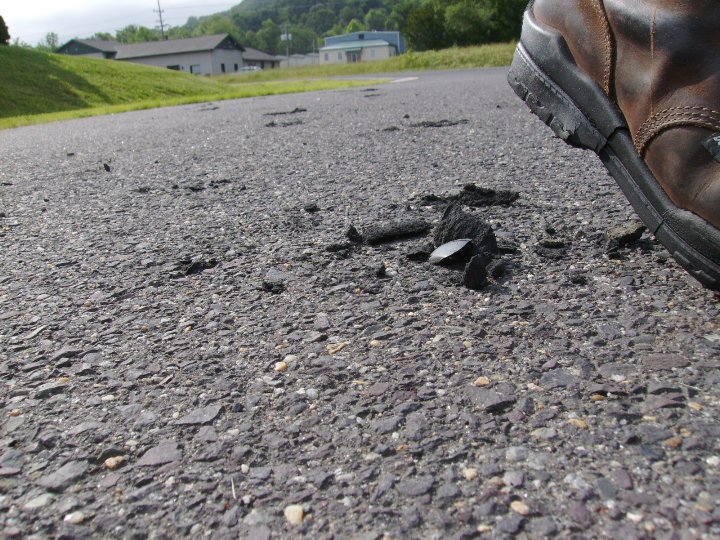 Bill's Trail of Tar
Bill's Trail of Tar
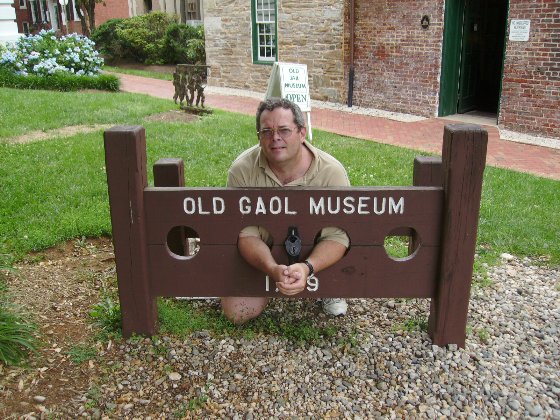 One of the usual suspects
One of the usual suspects
 Fishing shacks jut out of the water where land once stood
Fishing shacks jut out of the water where land once stood
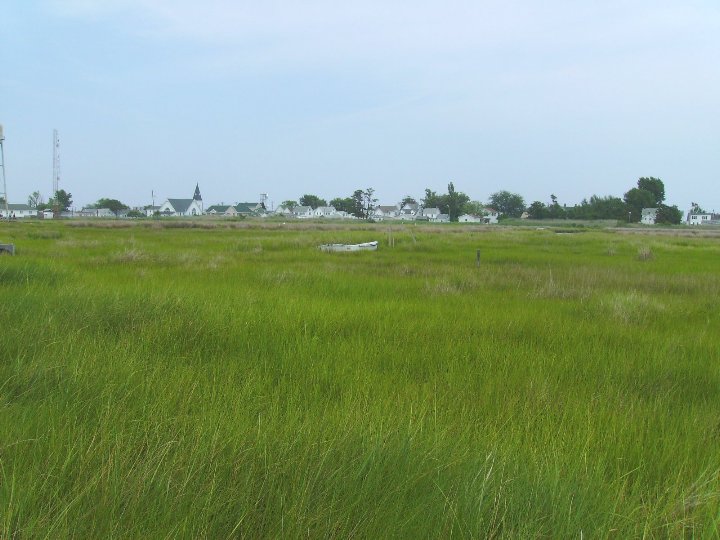 Tangier's marshy interior
Tangier's marshy interior
 Space is at a premium for all residents, living and dead
Space is at a premium for all residents, living and dead
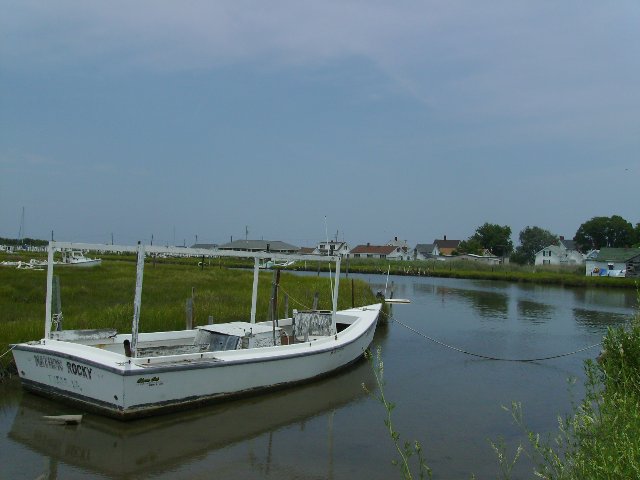 Stepping onto Tangier is stepping back in time
Stepping onto Tangier is stepping back in time
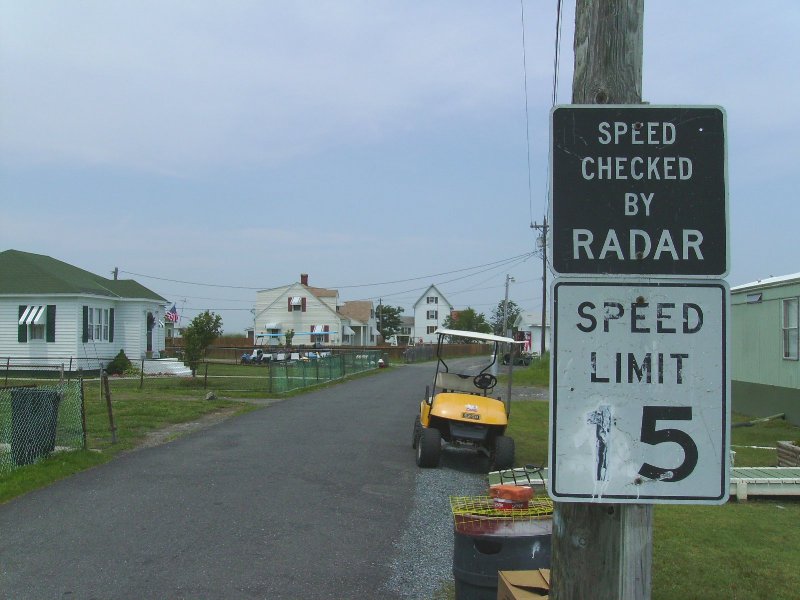 Tangier's signs show a sense of humor
Tangier's signs show a sense of humor
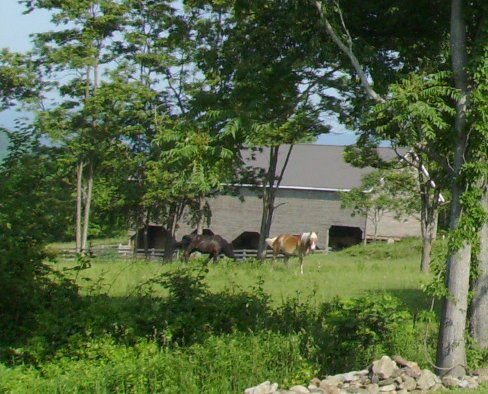 Why the long face?
Why the long face?
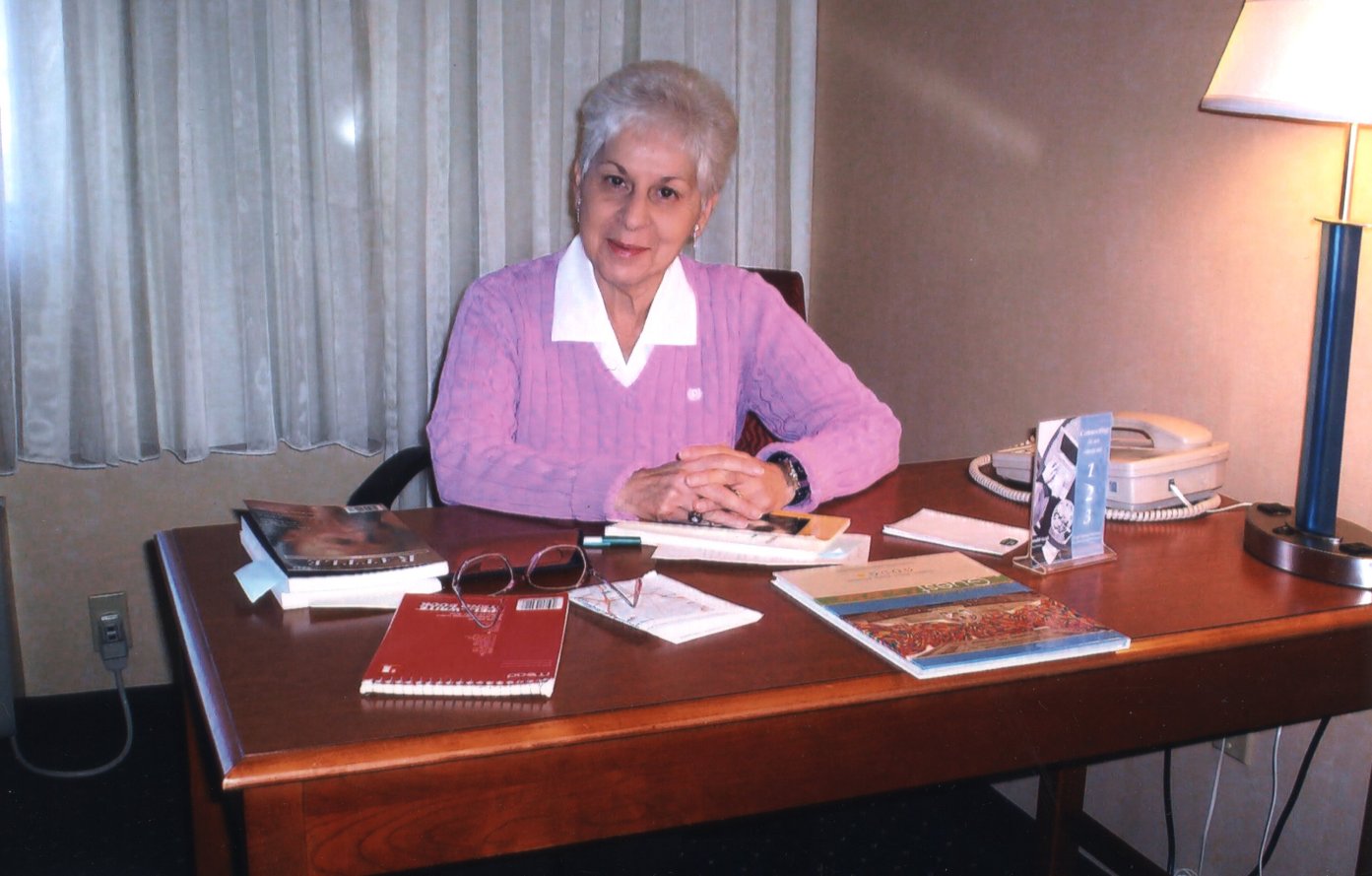 The Card Queen at her station
The Card Queen at her station
 Sunrise over Poquoson's marsh
Sunrise over Poquoson's marsh
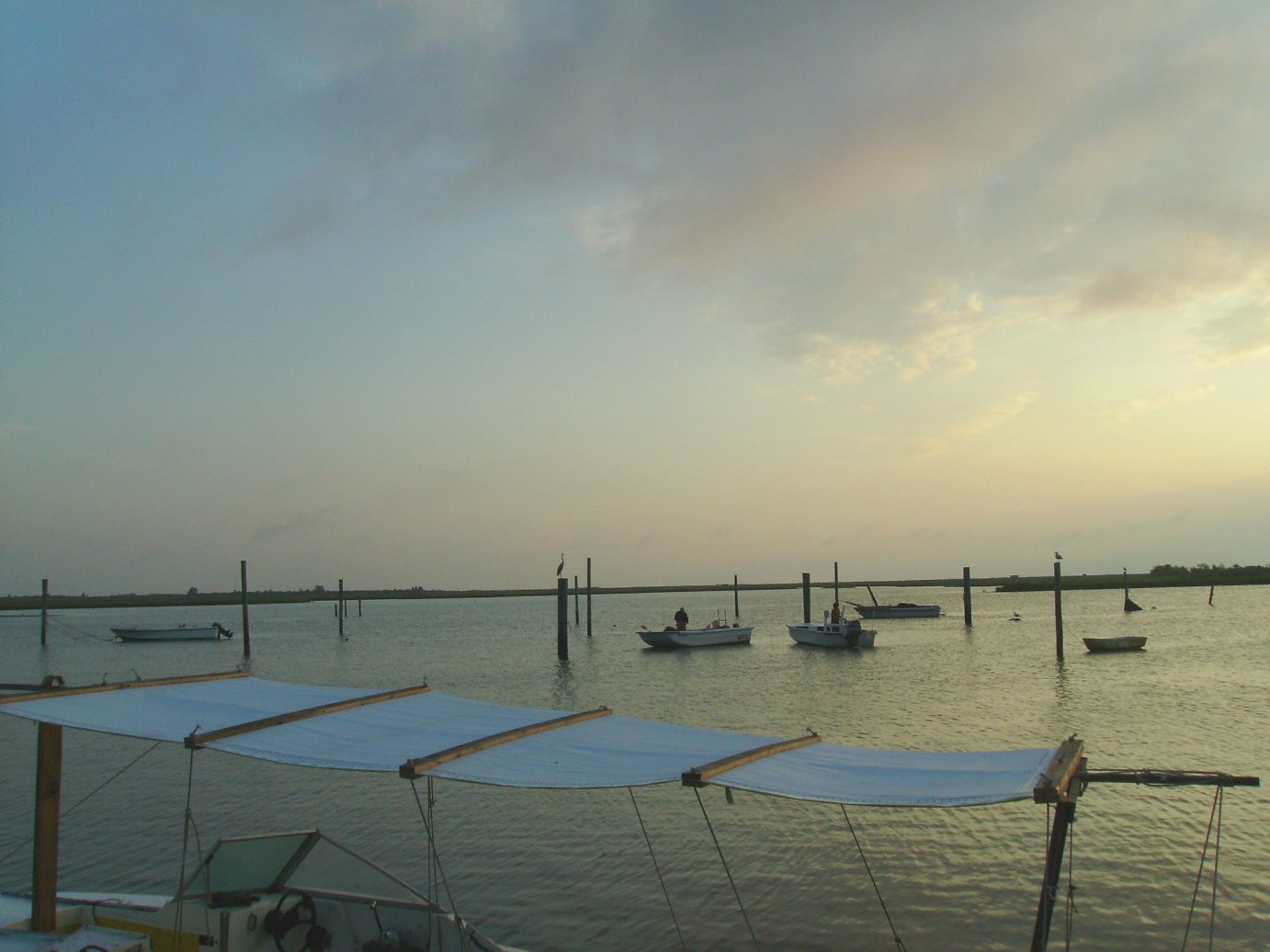 Work boats readying to go
Work boats readying to go
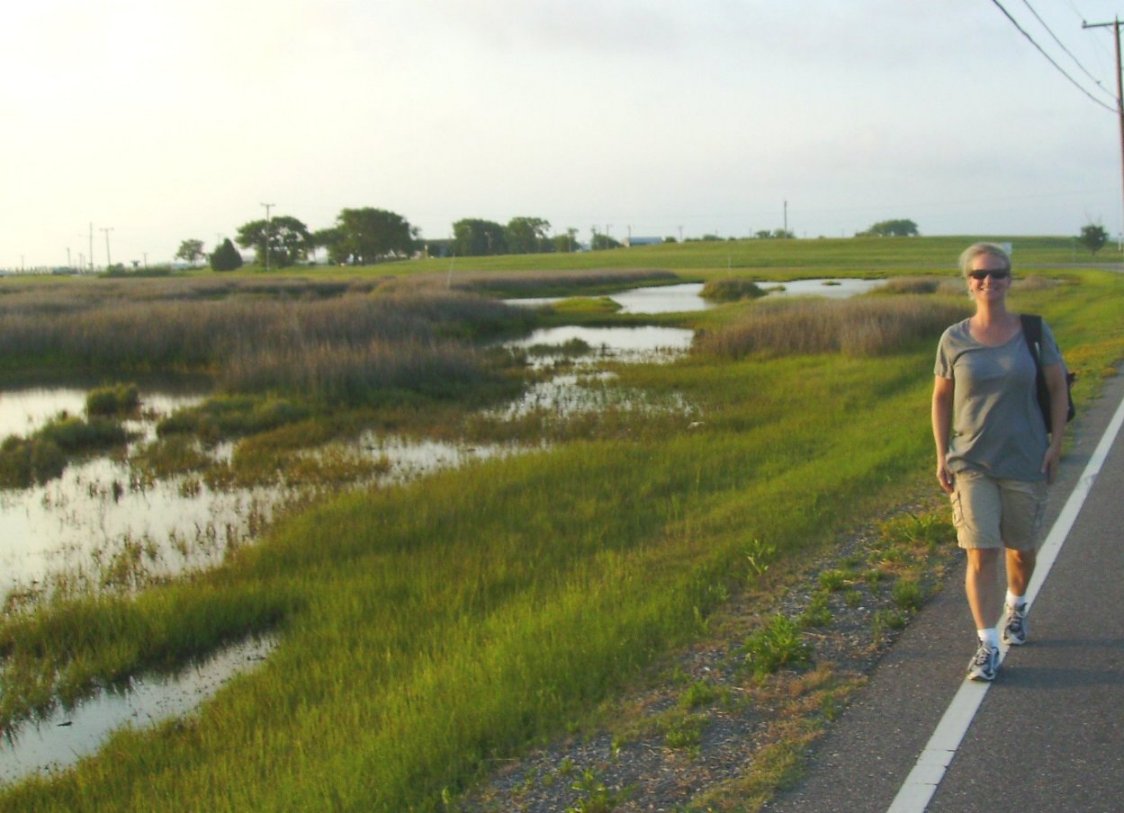 Not quite NYC, but almost
Not quite NYC, but almost
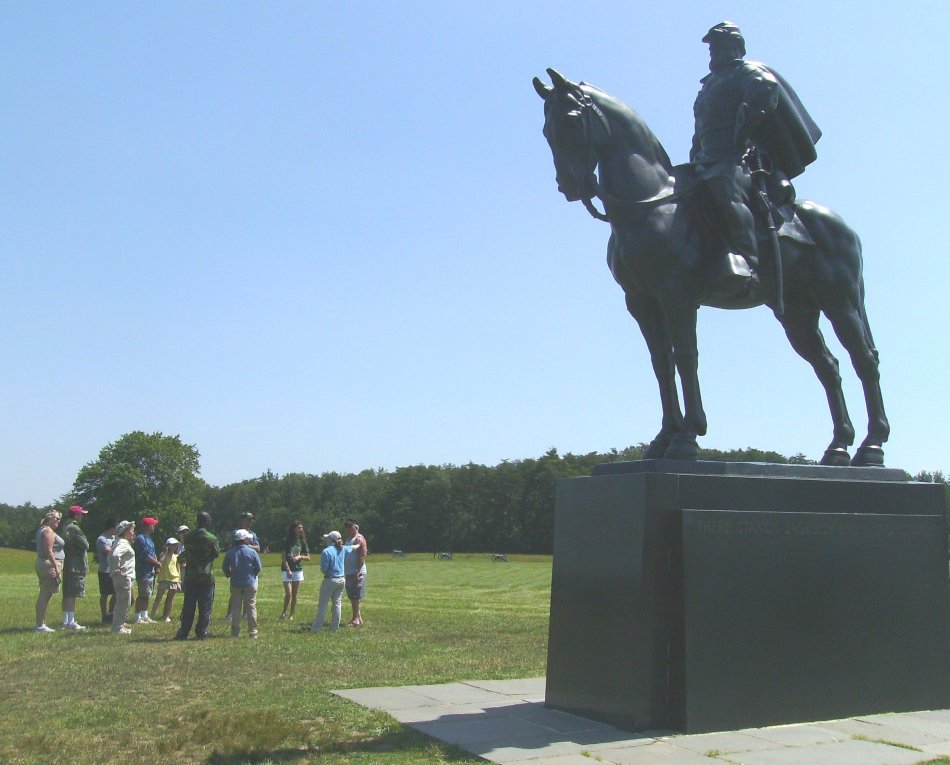 Mary educates the crowd while Stonewall Jackson looks on
Mary educates the crowd while Stonewall Jackson looks on
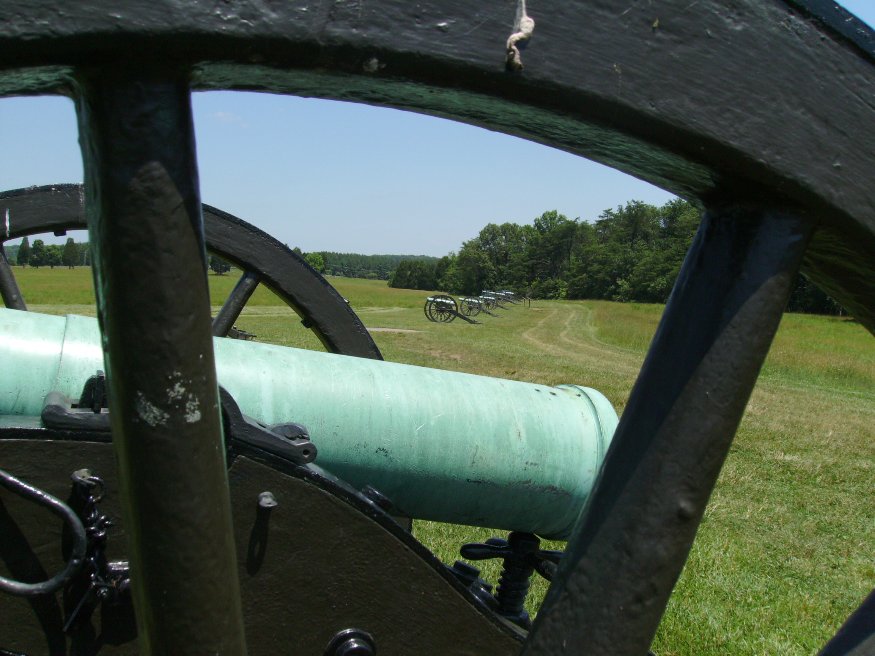
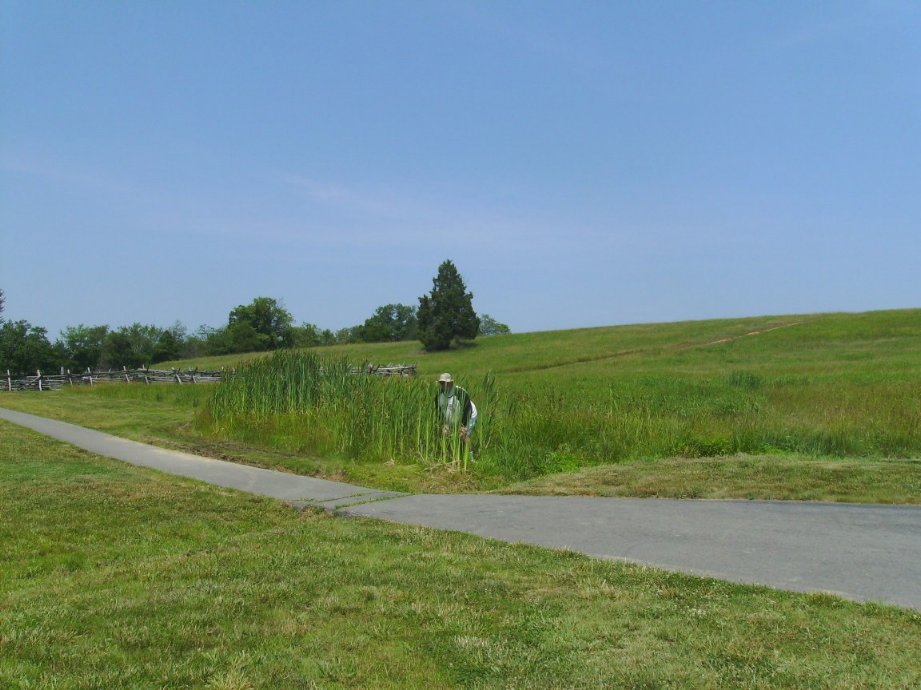 Taking his tour guide job seriously, Bill plays hide-n-seek on the trail
Taking his tour guide job seriously, Bill plays hide-n-seek on the trail
 Battleground of Third Jack-assas
Battleground of Third Jack-assas
 I foresee your wallet getting lighter
I foresee your wallet getting lighter
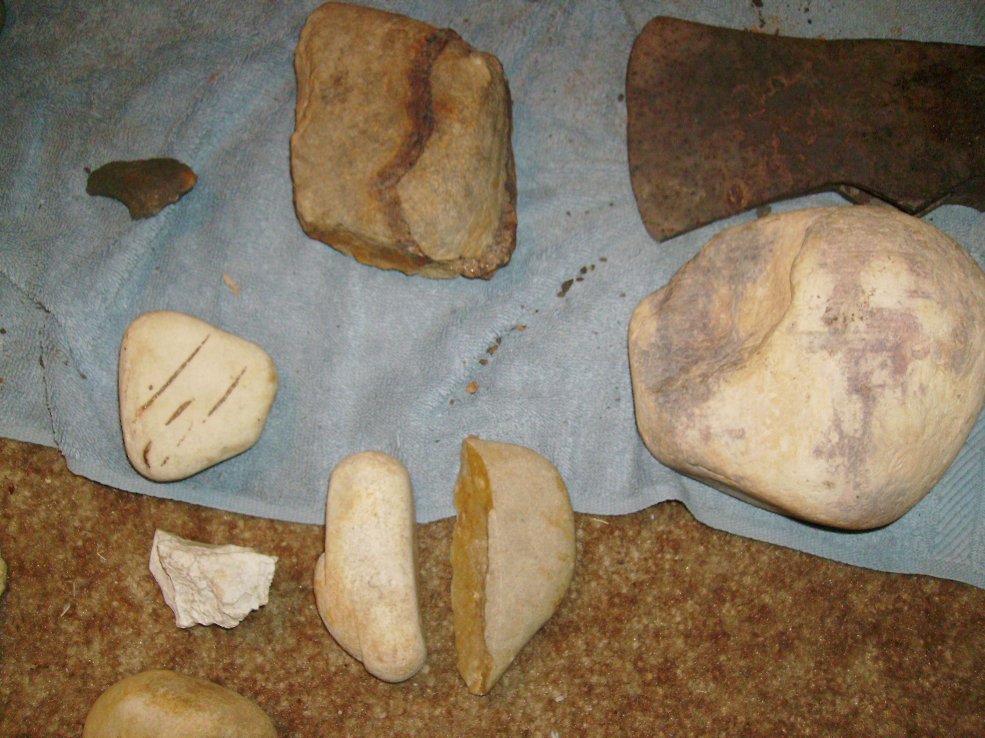 A few of Kip's finds
A few of Kip's finds
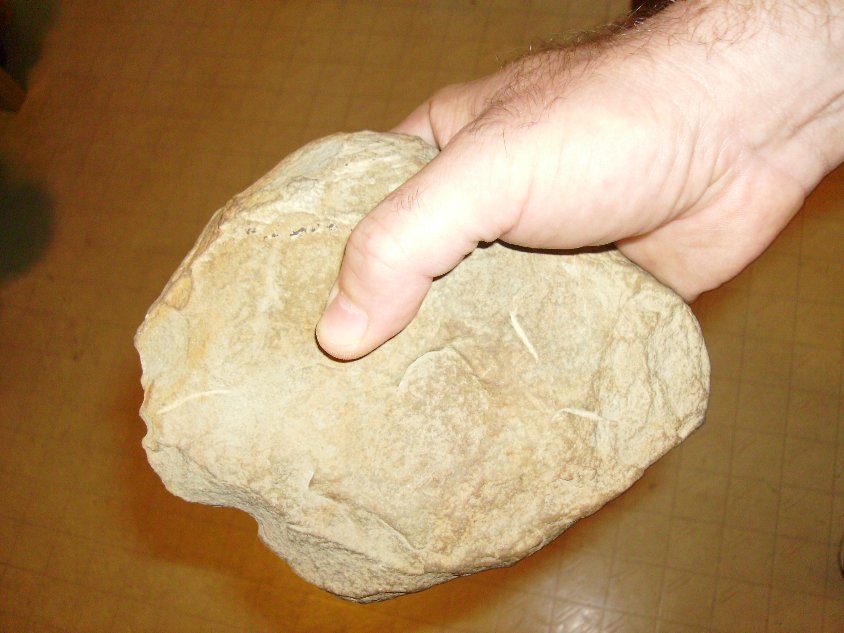 Demonstrating a hand axe
Demonstrating a hand axe
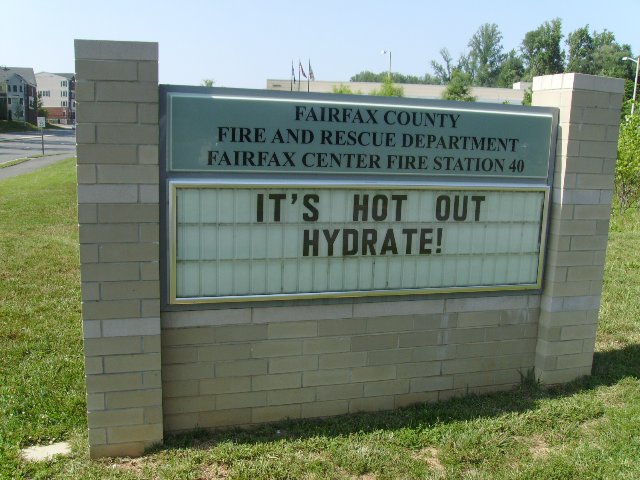 Well, duh!
Well, duh!